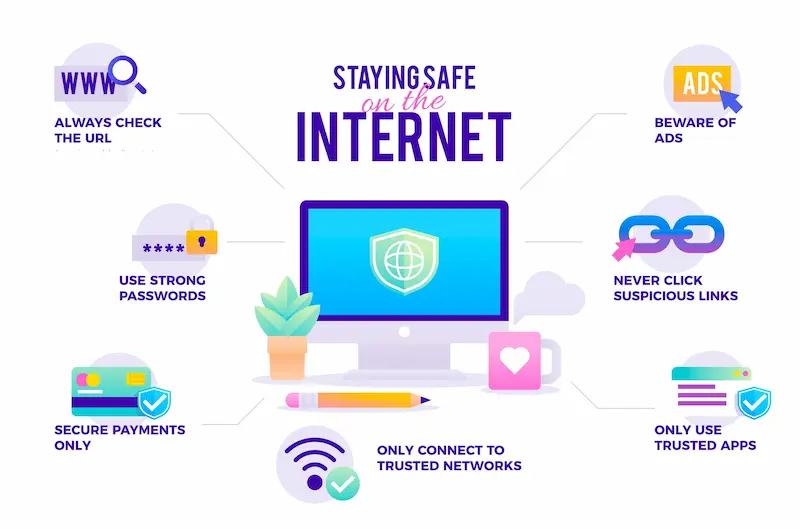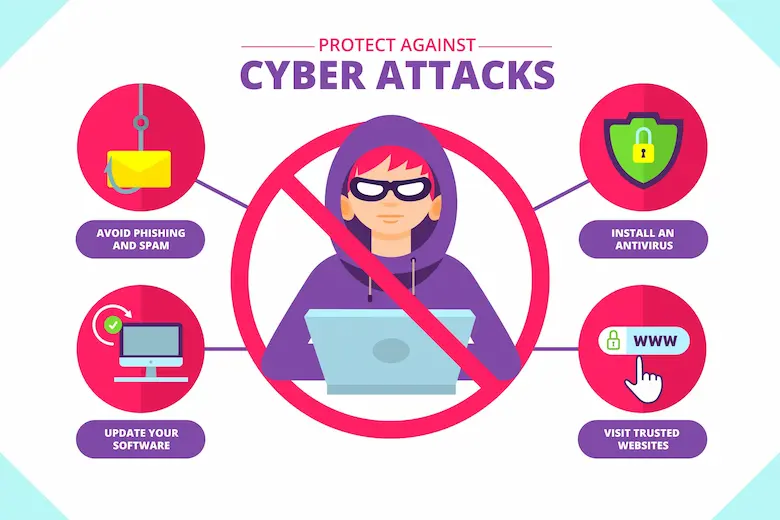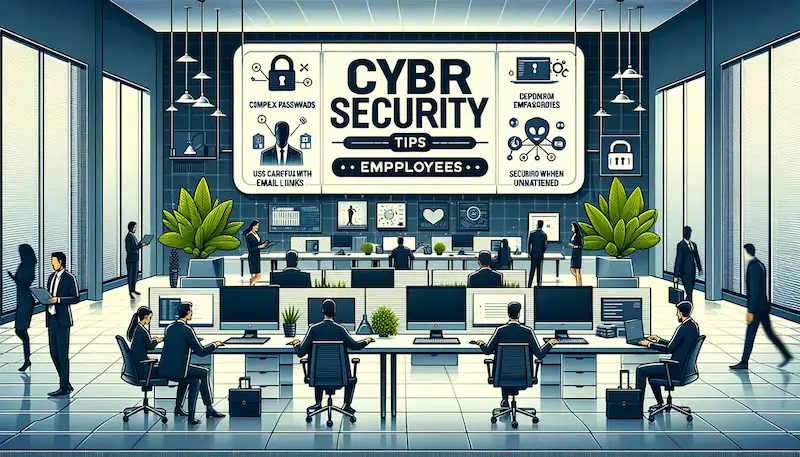Best Cyber Security Training for Employees in India

Best Cyber Security Training for Employees in India
Introduction to Cyber Security Training for Employees
Importance of Cyber Security
| Protection Against Cyber Threats | Training employees in cyber security is of the utmost importance, as it equips them with the necessary understanding and resources to safeguard both the organization and its personnel against a wide range of cyber threats, including but not limited to data breaches, phishing attempts, and malware. |
| Maintaining Confidentiality | The significance of protecting sensitive information, such as financial data, consumer data, and proprietary business strategies, is instilled in employees. |
| Legal Compliance | A company can avoid legal penalties and sanctions by ensuring compliance with data protection laws and regulations through knowledge of cyber security. |
| Building Trust | Cultivating a knowledgeable staff can bolster the confidence of stakeholders and clients in an organization’s capacity to safeguard their information. |
| Risk Management | Training in cyber security enables personnel to recognize and mitigate potential threats, thereby decreasing the probability of an effective cyber assault. |
Impact on Businesses
| Financial Losses | Significant financial losses can result from cyber attacks as a consequence of compromised corporate data, trade disruptions, and the expenses required to restore compromised systems and networks. |
| Reputation Damage | A devastating cyber assault that succeeds can harm a company’s reputation, resulting in a decline in business and a loss of consumer confidence. |
| Operational Disruption | Business operations may be disrupted by cyberattacks, resulting in delays and decreased productivity. |
| Legal Repercussions | Failure to safeguard consumer data or adhere to industry regulations could potentially result in legal ramifications for businesses. |
| Strategic Impacts | Cybersecurity incidents have the potential to unintentionally confer an advantage upon competitors by exposing business strategies and intellectual property. |
Cyber Security Training for Employees
Technology is boosting at a rapid pace in this world full of internet-based devices and equipment highly designed and developed for the ease of the human race. We sincerely require to have proper cyber security education for almost every stakeholder in the world.
Providing cyber security training for employees is an important step that businesses can take to help protect against cyber attacks. There are several organizations nowadays that are sincerely taking care of their business by training their employees with the best cyber security education.
Moreover, in this league of offering primetime cybersecurity training for employees in India, organizations tend to deliver the most of their employees with the best-in-class fundamentals of cyber security that they generally require to understand what steps need to be taken before and during a cyber attack on an IT infrastructure of an organization.
Fundamentals of Cyber Security Training
Basic Security Principles
Some of the basic cybersecurity principles are mentioned below:
- Confidentiality: Ensuring that only authorized individuals have access to sensitive information. This principle is of the utmost importance in safeguarding personal data and proprietary information.
- Integrity: Ensuring the consistency and precision of data throughout its entire lifecycle. This implies that unauthorized modifications or tampering with data are strictly prohibited.
- Availability: Assuring that authorized users have timely access to information and resources. This requires the routine installation of software updates, the maintenance of hardware, and the protection against cyberattacks that could disrupt access.
- Authentication: Conducting identity verification on entities, systems, or users prior to authorizing access to resources. Passwords, biometrics, or other methods are frequently employed to verify that users are who they claim to be.
- Non-Repudiation: Ensuring the verifiability of the source of a communication or transaction. This ensures accountability by not allowing an entity to deny its participation in an activity.
Essential Cyber Hygiene Practices
Several essential cyber hygiene practices are there that need to be exercised by individuals in order to stay avert from any kind of hacking and losing their sensitive datasets to the hands of malicious threat actors, such as:
- Use Strong, Unique Passwords,
- Regularly Update Software,
- Be Wary of Phishing Attempts,
- Secure Wi-Fi Connections,
- Back-Up Data,
- Enable Multi-Factor Authentication (MFA),
- Limit Access Privileges,
- Use Secure and Updated Hardware, etc.

Top 10 Cybersecurity Training for Employees
Since we are required to provide our workers with the best cybersecurity training for employees in India, we proactively need to deliver this training under the world-class guidance of primetime training instructors who have genuine experience in offering the same category of training.
In addition to this, the primetime pieces of cybersecurity training for employees are mentioned below:
- Cyber Security: One needs to be assured that one’s organizational workforce is duly ready to combat any cyber threats and cyberattacks during and before they happen.
- Be A Scam Scanner: Be cyber aware of all the currently ongoing scams and mainstream cyberattacks that are troubling society with their complexity.
- Cyber Security Awareness: Knowing more about the recent and highly proficient cyber security tools and tactics that are much needed for holding the ongoing cyber security awareness fundamentals.
- Cybersecurity Basics: Going with the cybersecurity basics in the first place can be a fruitful step for having the needful cybersecurity training for employees.
- Improve Your Online Business Security: If you are holding an organizational business, then you are certainly at a much higher risk of getting your database hacked by a remotely sitting cyber adversary. Hence, improving your online business security could be the best choice for your business benefits by simply taking a cyber security plan from a highly-renowned cyber security agency in India.
- Cyber Security For Normal People: Protect Yourself Online: It is highly recommended by many people, including IT and non-IT professionals, to protect themselves from cybercrimes, and for this, they significantly require cyber security for employees under strict circumstances so that they can genuinely learn everything they can about the cyber security fundamentals and varied tactics related to cyber security.
- Introduction to Cyber Security: Various courses tend to provide an introduction to cyber security; however, it is pretty hard to find a good course that provides all the fundamentals of cyber security right from scratch. In this case, you may trust Craw Security, which offers a world-class 1 Year Diploma in Cyber Security Course facilitated under the primetime guidance of globally recognized training instructors.
- Information Security Awareness: The common people also need to understand their basic information security, including the offline database to print media conservation, so that no anti-social elements can reach the highly secured documents that are in their possession. Hence, you need to apply offline security as well as cyber security so that no one can steal your highly secured database right under your nose.
- Introduction to Cybersecurity Tools & Cyber Attacks: To understand the main tactics of cyber security in a proactive manner, we generally require a proper introduction to cybersecurity tools & currently trending cyber threats and cyberattacks.
- Digital and Cyber Security Awareness Training for Employees: In the league of offering cybersecurity training for employees, we generally require prominent digital security awareness training for employees.

Online Cyber Security Training for Employees
Various companies have very hectic schedules for their employees. Hence, they cannot afford to spare the crucial timelines of their employees. As a result, they are generally required to keep their employees on board for handling their daily official work chores.
In this case, many online cyber security training for employees come into the light and help the employees to get plenty of cyber security education under the guidance of well-professional cyber security experts.
Understanding Cyber Threats
Gaining knowledge about the various categories of cyber threats and drawing insights from practical instances is crucial in order to formulate efficacious defense mechanisms against this ever-evolving and progressively advanced cyber assaults.
Types of Cyber Threats
There are several types of cyber threats in the current digital world, such as:
- Malware
- Phishing
- Man-in-the-Middle Attacks (MitM)
- Denial-of-Service (DoS) and Distributed Denial-of-Service (DDoS) Attacks
- SQL Injection
- Zero-Day Exploits
- Insider Threats
Real-world Examples

Some of the heinous real-world examples of cyber attacks happened so far are as follows:
| WannaCry Ransomware Attack (2017) | This worldwide cyber assault encrypted computer data with ransomware and demanded ransom payments to decrypt it. Hundreds of thousands of devices in 150 countries were impacted. |
| Target Data Breach (2013) | Credit and debit card information of more than 40 million Target customers was compromised by hackers who exploited a security system vulnerability at the retailer. |
| Sony Pictures Hack (2014) | An extensively publicized cyber assault in which malicious actors infiltrated Sony’s network and discharged confidential information, including unreleased films and employee biographical details. |
| Equifax Data Breach (2017) | Due to a flaw in a web application, the private information, including social security numbers, of approximately 147 million consumers was compromised. |
| Stuxnet (Discovered in 2010) | An advanced computer malware specifically engineered to undermine Iran’s nuclear program. It was one of the earliest instances of a cyber weapon specifically designed to target industrial infrastructure. |
| SolarWinds Hack (2020) | A substantial and intricate cyber espionage operation gained access to the SolarWinds software, thereby impacting a multitude of United States government agencies and private enterprises. |
Implementing Effective Training Programs
Steps for Successful Training
The prominent steps for a successful training procedure are mentioned below:
- Assessment needs,
- Define Training Objectives,
- Developing the Content,
- Choosing the Right Delivery Method,
- Implementing the Program,
- Engagement Strategies,
- Support and Resources, etc.
Measuring Training Effectiveness
| Feedback Surveys | Obtain immediate feedback from participants following the training in order to assess their reactions and perception of its value. |
| Knowledge Assessments | Implement pre-training and post-training evaluations to gauge the extent of knowledge or skill development. |
| Behavioral Observation | Observe alterations in workplace practices or behavior subsequent to the training in order to evaluate the implementation of acquired skills. |
| Impact on Performance | Assessment of the training’s influence on productivity and job performance. This may entail an evaluation of work outputs, work quality, or productivity. |
| Return on Investment (ROI) | Determine the return on investment (ROI) of the training program through a comparison of its expenses (including development, delivery, and time invested) and its benefits (such as increased productivity and performance). |
| Long-Term Evaluation | Implement follow-up evaluations at intervals of several months to ascertain the long-term sustainability of the training’s benefits. |
Legal and Compliance Aspects
Understanding Regulations
- Knowledge of Relevant Laws,
- Data Protection and Privacy,
- Industry-Specific Regulations,
- Cybersecurity Regulations,
- Cross-Border Compliance,
- Legal Updates, etc.
Compliance Requirements
- Implementing Policies and Procedures,
- Regular Compliance Audits,
- Training and Education,
- Data Management and Security,
- Risk Assessment,
- Documentation and Record Keeping,
- Reporting and Transparency, etc.
Cyber Security Tips for Employees
It is the need of the hour for every individual as well as organization to exercise safe cyber security best practices. And, in regard to doing this, we need certain cyber security tips for employees.

Moreover, here are a few tips that employees can follow to help protect against cyber attacks:
- Use strong and unique passwords: Use a combination of upper and lower case letters, numbers, and special characters to create strong passwords. In addition, avoid using the same password for multiple accounts.
- Enable two-factor authentication: Two-factor authentication adds an extra layer of security by requiring a second form of authentication (such as a code sent to your phone) in addition to your password.
- Be cautious when clicking links: Be cautious when clicking on links in emails, especially if you weren’t expecting the email or if it seems suspicious. Moreover, many expert cybercriminals often use links to spread malware.
- Keep your software and devices up to date: Make sure to install updates for your operating system, browser, and other software as soon as they become available. In addition, these updates often include security patches that help to protect against vulnerabilities.
- Back up important data: Regularly back up important data to a secure location, such as a cloud service or an external hard drive. As a general rule, this will help to protect against data loss in the event of a cyber-attack or other disasters.
- Use a secure network: Use a secure network, such as a virtual private network (VPN), when accessing sensitive data over public Wi-Fi.
By following these tips, employees can help protect themselves and their organizations against cyber attacks.
The Role of Employees in Cyber Security
In this discourse, we shall center on “The Role of Employees in Cyber Security,” with particular emphasis on their function, frequent errors they commit, and obligations in upholding cyber security.
Common Mistakes by Employees
- Weak Password Practices,
- Falling for Phishing Scams,
- Unsecured Use of Devices,
- Neglecting Software Updates,
- Sharing Sensitive Information, etc.
Employee Responsibility
| Education and Training | Employees should attend organization-provided cyber security training in order to remain current on the most recent threats and best practices. |
| Policy Compliance | Information protection is contingent upon strict adherence to the policies and guidelines governing the cyber security of the organization. |
| Proactive Security Measures | Employees ought to adopt proactive measures such as implementing two-factor authentication, performing routine password updates, and creating data backups. |
| Staying Informed | Maintaining awareness of the most recent cyber threats and comprehending the potential dangers that may be encountered in routine activities. |
| Collaboration | Engaging in collaborative efforts with the IT department or cyber security team, with a particular focus on incident reporting and potential vulnerability identification. |
Handling Security Breaches: Post-Training Actions
Incident Response
For the sake of incident response, a threat intelligence team would take some appropriate actions. Some of them are outlined below:
- Immediate Identification and Assessment,
- Containment Strategies,
- Eradication and Recovery,
- Incident Documentation,
- Post-incident analysis, etc.
Reporting Protocols
| Internal Reporting Procedures | Implement unambiguous protocols to enable personnel to disclose verified or suspected security incidents. Typically, this requires prompt notification to the internal security team or IT department. |
| External Notification Requirements | Legal responsibilities to inform external entities, including regulatory bodies, impacted consumers, or the general public, may vary contingent upon the compromise’s characteristics and the data at stake. |
| Communication with Stakeholders | Formulate a strategic communication plan targeting various stakeholders, such as partners, customers, employees, and potentially the media. This correspondence ought to be punctual, transparent, and unambiguous. |
| Legal and Regulatory Compliance | Ensure that all reporting is in accordance with all applicable laws and regulations. This may comprise precise reporting deadlines and stipulations regarding the information that is required to be disclosed. |
| Lessons Learned and Training Updates | Conduct a post-breach assessment and revision of training programs to incorporate insights gained from the occurrence. This assists in preparing personnel to manage similar situations more effectively in the future. |
Overcoming Challenges in Cyber Security Training
Addressing Employee Resistance
| Understanding the Root Causes | Determine the potential causes of employee resistance towards cyber security training. Frequent causes encompass inadequate comprehension of its significance, perceived insignificance to its position, or training fatigue. |
| Engaging Communication | Articulate the significance of cyber security in a manner that effectively connects with the workforce. Employ practical instances and situations from the real world to illustrate the possible repercussions on both the entity and its members. |
| Making Training Relevant and Interactive | Tailor training to ensure its applicability to various organizational positions. Incorporating interactive and captivating techniques, such as gamification or practical exercises, has the potential to enhance interest and foster greater participation. |
| Management Involvement | Promote the active engagement of management in the training process and advocate for its significance. Employee participation in training is enhanced when leadership demonstrates clear support and appreciation for it. |
| Feedback and Continuous Improvement | Utilize feedback from employees regarding training programs to inform enhancements. With time, resistance can be diminished by recognizing and attending to their concerns. |
Resource Allocation
There are various primetime methods that you may employ for the process of resource allocation. Some of them are mentioned below:
- Budgeting for Training,
- Efficient Use of Resources,
- Time Management,
- Leveraging Technology,
- Continuous Learning Approach, and many more.
FAQs
About the Best Cyber Security Training for Employees in India 2024
1: How do I train my employees for cyber security?
You may get your employees duly trained for cyber security by employing a world-class cyber security training institute on the job, either on your premises or at their institutional premises. In this regard, Craw Security would be the best fit for your organization to train your employees with all the best tactics and techniques of cyber security by high-class instructors having many years of authentic experience in the same.
You just need to call us at +91-9513805401 and get it done on time.
2: What training is required for cyber security?
You may do the 1 Year Cyber Security Diploma or else choose from a vast list of cyber security courses from the official website of Craw Security at very cost-friendly prices.
3: How important is cybersecurity training for employees?
It is essential for all the employees of any industry to train under the best cybersecurity practitioners of world-class cybersecurity fundamentals. In this case, Craw Security would help you prominently by training your employees under the strict supervision of highly qualified and certified trainers of cyber security professionals. One just needs to make a quick call and have a word with our educational counselors at +91-9513805401.
4: Can I teach myself cyber security?
Yes, you may. There are many institutions in the wild that are providing online training in cyber security to everyone who has a glitch in their time management and want to learn cyber security via the online mode of class conduction.
5: What are 3 skills you must have for cyber security?
The main 3 skills that one must have for cyber security in order to become a cyber security expert are as follows:
- Technical Knowledge
- Problem-Solving Tactics
- Enhanced Communication Patterns
6: What should employee security training include?
The mainstream factors that should be considered while training cybersecurity an employee are as follows:
- Teaching employees to recognize and report suspicious activity.
- Training employees on identifying phishing emails and other types of cyber attacks.
- Teaching employees to create and use strong passwords.
- Explaining and enforcing the company’s acceptable use policies for technology and internet access.
- Providing guidance on the proper storage, disposal, and transmission of sensitive data.
- Teaching employees how to recognize and respond to potential data breaches.
- Instruct employees on the importance of keeping their personal and business accounts separate.
- Explaining the consequences of failing to comply with security policies and procedures.
- Offering prime knowledge to employees on the proper use of two-factor authentication and other authentication methods.
- Educating employees on the importance of avoiding using public Wi-Fi networks.
7: Can you learn cyber security in 3 months?
Yes, you may learn cyber security in even 1 month; however, there will be a question about how much one can attain while learning cyber security. In this case, Craw Security comes into the limelight and trains anyone with a systematic approach right from scratch in its diploma courses with timelines of 6 months and 1 year. You just need to call +91-9513805401 and book a demo slot for yourself or anyone whom you are searching for.
8: What is the first thing to learn in cyber security?
The first thing to learn in cyber security is the fundamentals of the field, such as understanding the different types of threats and how to protect yourself from them. In addition, this includes learning about malware, phishing, social engineering, and other attack vectors, as well as the basics of encryption and network security. Additionally, it is important to stay up to date on the latest security news and trends in order to be as prepared as possible.
9: Is IT too late to learn cybersecurity?
No, it is never too late to learn cybersecurity. Cybersecurity is an ever-evolving field, and new technologies and techniques are continually being developed. With the right resources and dedication, anyone can learn the basics of cybersecurity and become proficient in the field.
10: What are the 7 types of cyber security?
The 7 types of cyber security technologies are as follows:
- Network Security
- Application Security
- Endpoint Security
- Cloud Security
- Data Security
- Identity and Access Management
- Disaster Recovery and Business Continuity
Wrapping Up
In the bottom line, we would like to draw your attention to the prime goal of understanding that it is vital to provide cyber security training for employees in India amid these ongoing challenges we are facing in our day-to-day lives for securing our digital assets. Moreover, we can say that cyber security training is essential for employees in India to help protect against cyber attacks. By providing employees with the knowledge and skills they need to identify and prevent cyber threats, businesses can reduce the risk of data breaches and other cyber security incidents.
In order to be effective, cyber security training should be mandatory, relevant, interactive, and ongoing. By following these principles, businesses can ensure that their employees are well-equipped to handle the ever-evolving cybersecurity landscape and keep their organizations safe from cyber threats.

















